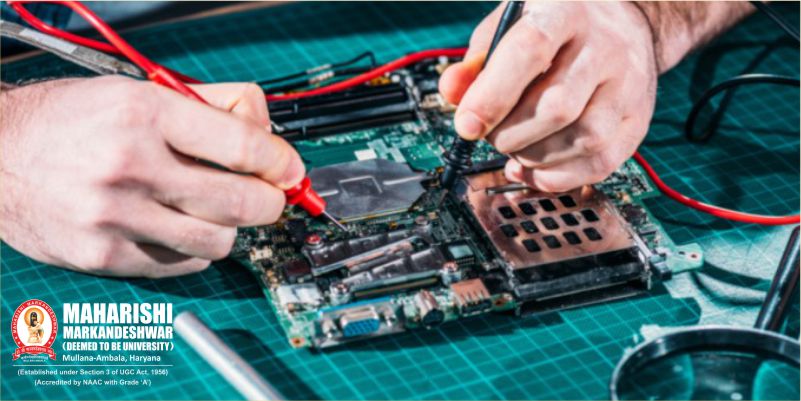Electrical Engineering is one of the branches of engineering which attracts the maximum number of youth for all the good reasons such as job security and salary. The growth factor in electrical engineering purely depends on the requirement of industries and research centres. However, it is not a field which is a hard nut to crack, but gets easier with time which makes doing B.Tech in Electrical Engineering a perfect career selection for engineering-minded youth.
Students often ask career counsellors about what kind of education is required to be an electrical engineer along with queries on the best electrical engineering colleges in Haryana and India. The answer is – A minimum of bachelors degree is required to work in the field of electrical engineering. It is one of the branch in which students acquire the basic knowledge of engineering with mathematics and science. The most promising aspect of this field is – Growth for brilliant minds is tenfold!
The work of electrical engineers is to visualize the complex processes in designing, fabrication, analyses and testing of systems with robust performance such as to meet or fulfil the future demands. The opportunities for the jobs in electrical engineering come with a sense of more responsibilities which requires vast knowledge of electrical field. The electrical engineers can also explore for higher education in the specialized areas which leads them to acquire degrees such as M.Tech and Ph.D in different research areas. Taking more responsibility & furthering education means a bright future to deal with the fast-paced world and technologies.
If a beginner wants to pursue a career in electrical engineering, he or she should choose to focus on subjects like physics and mathematics to gain the basic knowledge of trigonometry, algebra, calculus, technical drawings etc. in high school.
Electrical Engineering Colleges in Haryana
Electrical engineering colleges in Haryana are going extra mile and leaving no stone unturned to provide a B.Tech. degree course. All these engineering colleges are having good student teacher ratio and best placements in reputed sectors. Students are advised to research in detail about various electrical engineering colleges, look at their students’ placement data and alumni performance, study the college’s education approach and finalize which one they wish to enrol in.
Students who are looking for career in Electrical Engineering are advised to:
- Study the college’s education approach.
- Look at their students’ placement data
- Alumni Feedback.
- Infrastructure
- Laboratories
- Hostel Facilities
- Transportation Facilities
- Library
- Research Centres
- Sports Facilities
On the basis of these features; students’ should finalize which best engineering college they wish to enrol in.
Popular Field of work for electrical engineers:
- Power generation and distribution
- Rail electrification
- Renewable sources
- Residential and commercial construction
- Services like lighting, heating, ventilation and lift system
- Installation and Commissioning of electrical equipments.
So, the electrical engineering branch of education pervades throughout our lives and is like a backbone to our systems and processes.
Career Opportunities after B.Tech in Electrical Engineering
Electrical engineers can find work in:
- Energy sector
Main duties of electrical engineers in energy field involve creating, testing, securing and implementing all the elements of an electrical plant (such as switchgear, transformers, motors, cables, generators) and improving electric power generation. They can also be responsible for creating and operating industrial equipment such as boilers, turbines, generators, diesel, pumps, condensers, compressors, pressure vessels. Sometimes, electrical engineers get involved in the initial processes of designing power system facilities.
- Electronics Industry
In the electronics industry, engineers design, develop and test components (capacitors, diodes, resistors, transistors), devices, systems or equipment that use electricity as part of their source of power, from cell-phones and computers to refrigerators and heating systems. Electrical engineers can engage in any stage of a project for creating electronics, from the brief planning to the design, manufacture and testing.
- Marine Industry
Marine electrical engineers develop the engines of ships and deal with electrical and electronic engineering operations, maintenance, and repairs on generators, motors, transformers, and emergency power systems on all types of vessels. They also make efficient measurements and operations of the electrical power generation, distribution and consumer machinery. They are essential to the safety of marine travel.
- Automotive Industry
In the automotive sector, electrical engineers manage the creation, operation, maintenance and test all tools, instruments and components of a car that involve electric power. Automotive Electrical engineers take care of engine controller, safety systems such as air-bags and anti-lock brakes, battery, motor, radio, navigation systems, electric locks, electric windows, etc.
- Aerospace Industry
Electrical engineers who work in the aerospace industry can get involved in many diverse activities like designing the interface that transfers electricity from the engine to the aircraft, guidance systems, communication systems and networks, radar and ground stations.
- Oil and gas Industry
In the oil and gas industry, electrical engineers are responsible for designing and maintaining electrical systems and components of refineries. In addition, they have to make sure that all components meet the right standards of safety and efficiency.
- Medical Industry
So far, electrical engineering has contributed immensely in the innovation of several useful medical devices, like the echocardiogram, prosthetic devices, the pacemaker and others. Electrical engineers can help design electrical circuits, software and other electronic components used in creating medical equipment.
- Government Sector:
Many public sector (PSUs) companies which belongs to any of the above mentioned industries recruit Electrical Engineers through GATE exam
- Software Industry:
Electrical engineer can also work for Software Company and their work as a software engineer typically includes designing and programming system-level software: operating systems, database systems, embedded systems and so on. They understand how both software and hardware function.
- Renewable Energy Sector:
Renewable energy generation is the emerging field for electrical engineers. Solar and wind energy are the growing sectors which moves the world towards the green energy due to environmental factors such as pollution, depletion fossil fuels. Electrical engineers have a great opportunity to do work in the area of renewable energy sector for the generation of electricity with improved efficiency of the electrical equipments.


